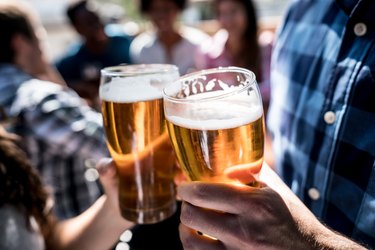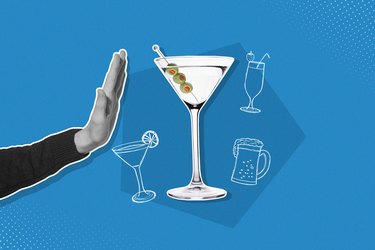
If you've ever felt a spike in your heartbeat while drinking that Long Island iced tea, you might wonder if there's a connection between alcohol, resting heart rate and even heart health. Here are some key points to remember next time you find yourself reaching for an alcoholic beverage.
Alcohol's Short-Term Heart Effects
Video of the Day
Having a drink is one of the ways many people wind down in the evenings, but it's important to enjoy alcoholic beverages in moderation, per the American Heart Association (AHA), because of the short-term health risks. Drinking too much in one sitting can be tied to an irregular, fast heartbeat and other acute heart effects, according to a January 2017 review article in Alcohol Research.
Video of the Day
Too much alcohol can lead to low blood pressure in some instances. "Alcohol is a diuretic and may actually dehydrate some people," says Marc Eisenberg, MD, a cardiologist and associate professor of medicine at Columbia University Irving Medical Center in New York City. "That can cause their blood pressure to be low and, in response to low blood pressure, the heart rate may increase."
So, how can you blunt these short-term effects of alcohol on your heart? In addition to moderating alcohol intake, "make sure to drink fluids and eat some food between drinks," Dr. Eisenberg says.
When it comes to alcohol consumption, the current Dietary Guidelines for Americans define "moderation" as no more than one to two drinks a day. According to the guidelines, the equivalent of one drink translates to:
- 12 fluid ounces of regular beer containing 5 percent alcohol
- 5 fluid ounces of wine containing 12 percent alcohol
- 1.5 fluid ounces of 80-proof distilled spirits containing 40 percent alcohol
Long-Term Heart Effects of Heavy Drinking
"It is known that a moderate amount of alcohol intake appears to have several health benefits for many people," Dr. Eisenberg says. "However, there is a fine line between when the beneficial effects of alcohol can turn into deleterious health effects."
It's important to note that studies have not yet shown a cause-and-effect relationship between drinking alcohol and better heart health, per the AHA.
Consistent binge drinking — defined as four to five or more alcoholic beverages over a period of two hours, according to the Centers for Disease Control and Prevention (CDC) — can strain your heart and other organs in the long term, per the AHA.
"It should be noted that heavy alcohol intake has been shown to increase one's risk of many medical conditions, as well as one's risk of sudden death," Dr. Eisenberg says.
"It is also known that heavy alcohol intake can increase one's blood pressure, as well as one's risk of developing heart failure and abnormal heart rhythms such as atrial fibrillation," he adds.
Who Should Avoid Alcohol
If you drink alcohol, discuss the pros and cons of moderate alcohol use with your doctor, and be aware of the heart and other health risks that may come with drinking, according to the AHA. Keep in mind you shouldn't drink alcohol for health benefits that haven't been proven by science, especially if you don't already drink.
Some people should avoid alcohol altogether, according to the AHA, including:
- Anyone younger than 21
- People who are pregnant or want to become pregnant
- People with certain health conditions, including gout, hepatitis and depression
- American Heart Association: “Is Drinking Alcohol Part of a Healthy Lifestyle?”
- Centers for Disease Control and Prevention: “Binge Drinking”
- Marc Eisenberg, MD, cardiologist, associate professor, Columbia University Irving Medical Center, New York, New York
- U.S. Department of Health and Human Services and U.S. Department of Agriculture: “Dietary Guidelines for Americans 2015-2020, Eighth Edition”
- Alcohol Research: "Alcohol's Effects on the Cardiovascular System"



